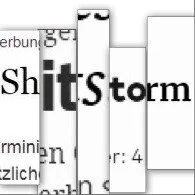Swearing Like the Germans
For as long as I’ve been training and coaching English, I’ve been keeping numerous lists of interesting words I hear. Sometimes it’s a colloquial phrase in German that made me laugh or other times it’s a word or two that I want to learn. By far the biggest is my ever-increasing list of what Germans would categorise as “Bullshit Bingo” words. These are words that the people I work with hear in their offices and either find totally meaningless or they don’t really understand. Most of the time, these are simply English buzzwords or “management speak”. It’s quite common to hear full German sentences dotted with an occasional “sustainability”, “impact” or “Low hanging fruit”. My German colleagues have their own lists, and some will flip to the back of their notebooks in a meeting to check-off the word, in an act of defiant passive aggression.
English loan words are nothing new to German, there are plenty to find out in the wild. Many people might know that “Handy” is German for mobile phone or that “Showmaster” is the word used for a game show host. These words are fully adopted everyday German words, something that are distinctive from everyday Denglish (misused English words in German) that might be heard on radio, TV or found in advertising campaigns. Obviously, “Handy” at one point was Denglisch but over time it has become the accepted part of the German lexicon, to the point that it isn’t even worth pointing out that handy in English really refers to something useful. The meaning of this word has been imbued with meaning by German speakers and is now German, rather than a bastardisation of English.
That being said, there are still plenty of misused English words in German. Looking at my list, here are a couple of the most egregious:
Upgedated – to update
Gereviewed – Reviewed
Gebugged – To debug
Late bird – to be late for something
For my colleagues, these words are less than pointless. For them, this type of language is meaningless because German either already has words for these concepts or the English would be sufficient, the only real reason that someone might use them is to show-off in front of others or to sound important. Rather than showing a person as worldly and cultured, this language use or rather misuse, is detrimental to the speaker. This of course creates problems when the people using these words are supposed to be leading teams and departments.
It’s perfectly possible that any of these words might suddenly be adopted into the German lexicon just like the word “handy”. How Germans feel about these words and phrases can differ, but if an English word becomes popular enough, it will be welcomed into the Duden (German dictionary). This eventuality is never guaranteed and unsurprisingly there are groups in Germany who find the increasing adoption of English words as a worrying trend.
As an English native-speaker, I see Denglish in a slightly different light. As odd as they might sound scattered among German language structures, English(ish) words can be a source of comfort, little English islands in a sea of complex German pronunciation. However, my personal perspective is not shared by many in the English-speaking community of Germany. One word in particular seems to the subject of the most opprobrium, “Shitstorm”.
“Shitstorm” is one of the most favoured words of journalists and politicians alike. Angela Merkel, Chancellor of Germany, is fond of using the word to describe a serious political debacles and any utterance of the term is met with equal measures of laughter and scorn in the English speaking world. For those outside Germany, Merkel’s use of “shitstorm” can be seen as straight talking, how often does a head of state swear during a press conference? For those English speakers inside Germany, there is a sizable contingent that see it as symptomatic of the German misuse of English, especially with regards to swear words.
Swearing is a strange part of language, as anyone who has attempted to learn another language will attests. As I prepared to write this article, I thought about how many actual English swear words I would feel comfortable writing down. The answer is simple; not that many. The reason I might have this issue could be as simple as the level of emotional connection I have with certain words. English swear words are layered with emotion and context, whereas German swear words have very little connection for me. I can use them more freely, simply because I feel disconnected to them.
This emotional connection is critical to the use of “Shitstorm” as it is with other English language swear words such as “Fuck”. My compatriots in the English-speaking community of Germany will often complain bitterly that Germans are far too free to use English swear words, especially in places they shouldn’t be found, such as in front of children. I understand this feeling, although I’m less inclined to upbraid Germans who choose to do so. As a study of emotional connection to language suggests:
“the results of a web questionnaire for bilinguals on expressing emotions in [their second language (L2)], notices that words connected with emotions may be considered 'disembodied' in L2, whereas in [their first language (L1)] they seem natural, even if they are considered 'taboo' expressions, terms of endearment, or swear words.”
The lack of emotional connection to “Shitstorm” is one factor, but it is also the case that “Shit” or “Scheiße” has a different use in German. Listening to my German family sitting around the dinner table, the word is used liberally to describe things, to make a point or simply as an exclamation of dissatisfaction. In the larger context of German communication, the word can be heard in all manner of unexpected situations. I have heard it uttered by nurses, doctors, in the bakery, by teachers, by children, standing waiting in a queue and even in church. “Scheiße” is multipurpose, and I have yet to hear anyone seriously complain.
Since English has become a global language, it shouldn’t be too much of a surprise to find it being used and abused around the world. The question is: How much ownership does an English speaker have over their native language? I would say very little, especially once an English term has been fully adopted. English words will always have an attraction in Germany, if only because they are so much part of everyday life online and in entertainment. Whether “shitstorm” is correct in English or not is no longer relevant, it has become German and Der Shitstorm is unlikely to disappear anytime soon.
Image Credit
Photo by Jonathan Cooper on Unsplash








